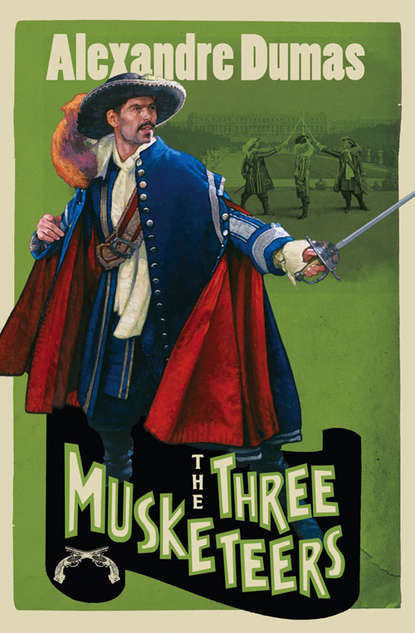По всем вопросам обращайтесь на: info@litportal.ru
(©) 2003-2024.
✖
The Three Musketeers
Автор
Год написания книги
2018
Настройки чтения
Размер шрифта
Высота строк
Поля
“The cardinal’s guards!” exclaimed Porthos and Aramis at the same moment. “Sheathe swords—gentlemen—sheathe swords!”
But it was too late. The combatants had been seen in a position which left no doubt of their intentions.
“Hollo!” cried Jussac, advancing towards them, and giving a signal to his men to do the same. “Hollo, musketeers! What, fighting here? And the edicts—are they forgotten, eh?”
“You are extremely generous, gentlemen of the guards,” said Athos, in a tone of the most bitter animosity, for Jussac had been one of the aggressors on the night before last. “If we saw you fighting, I promise you that we should not prevent it; therefore let us alone, and you will enjoy the spectacle without any of the pain.”
“Gentlemen,” answered Jussac, “it is with regret I declare that what you request is impossible. Duty must take precedence of everything else. Sheathe, therefore, if you please, and follow us.”
“Sir,” said Aramis, parodying Jussac’s manner, “if it depended upon ourselves, we should accept your polite invitation with the utmost pleasure; but unfortunately the thing is impossible. M. de Treville has forbidden it. Move on, therefore; it is the best thing you can do.”
This mockery exasperated Jussac. “We will charge you,” said he, “if you disobey.”
“They are five,” said Athos in a low voice, “and we are only three; we shall be beaten again, and we must die here; for I positively swear that I will not again appear before the captain a vanquished man.”
Athos, Porthos, and Aramis closed up to each other, whilst Jussac drew up his men. This moment of delay sufficed for d’Artagnan to form his resolution. It was one of those moments weighed with a man’s whole destiny; it was a choice between the king and the cardinal, and this choice, once made, must be adhered to. To fight was to disobey the law, to risk his head, and, by one blow, to make an enemy of a minister more powerful than the king himself. All this the young man plainly perceived, and we must do him the justice to declare that he did not hesitate a single instant.
“Gentlemen,” said he, “you must allow me to correct one thing which you have said. You affirmed that you were but three; but it appears to me that there are four of us.”
“You are not one of us,” said Porthos.
“True,” replied d’Artagnan, “I have not the dress, but I have the heart and soul of a musketeer; I feel it, sir, and it impels me along, as it were, by force.”
“Hark ye, young man!” cried Jussac, who doubtless, from d’Artagnan’s gestures and the expression of his countenance, had divined his intentions; “you may retire; we permit you; save your skin, and that quickly.”
But d’Artagnan moved not a step.
“You are unquestionably a man of spirit,” said Athos, pressing the young man’s hand.
“Come, come; decide, decide!” exclaimed Jussac.
“We must make up our minds,” said Porthos and Aramis.
“You are truly generous,” said Athos to d’Artagnan.
But all three thought of d’Artagnan’s youth, and feared his inexperience.
“We are but three, and one of us wounded, exclusive of this boy,” remarked Athos; “and yet it will be said that we were four men.”
“Ay, but to retreat!” said Porthos.
“It is difficult,” said Athos.
“Quite impossible!” said Aramis.
D’Artagnan comprehended the cause of their irresolution. “Gentlemen,” said he, “only try me, and I pledge you my honour that I will not leave this spot except as a conqueror.”
“What is your name, my fine fellow?” said Athos.
“D’Artagnan, sir.”
“Well, then, Athos, Porthos, Aramis, and d’Artagnan, forward!” exclaimed Athos.
“So, you have made up your minds, gentlemen?” cried Jussac for the third time.
“Quite so,” replied Athos.
“And what is your resolve?” demanded Jussac.
“We are about to have the honour of charging you,” replied Aramis, raising his hat with one hand, and drawing his sword with the other.
“Ah! you resist!” cried Jussac.
“Mortdieu! Does that surprise you?”
And the nine combatants rushed upon each other with a fury which did not, however, exclude a kind of method. Athos took Cahusac, one of the cardinal’s favourites; Porthos selected Biscarrat; and Aramis found himself opposed to two adversaries. As for d’Artagnan, he sprang towards Jussac himself.
The heart of the young Gascon throbbed violently, not with fear, but with eagerness. He fought with the fury of an enraged tiger, turning round his adversary, and every moment changing his guard and position. Jussac, as we have before said, was a most skilful and experienced swordsman; nevertheless, he found the utmost difficulty in defending himself against his adversary, who, active and nimble, perpetually deviated from all the received rules of fencing, attacking on all sides at once, and yet at the same time guarding himself like one who had the greatest respect in the world for his own person. At length the struggle was brought to a conclusion by Jussac’s rashness. Furious at being thus held at bay by one whom he regarded as a mere boy, he became less cautious, and committed various indiscretions; whilst d’Artagnan, who, although deficient in practice, had a profound knowledge of the theory of the art, redoubled his agility. Jussac, eager to dispatch him, made a tremendous lunge, at the same time breaking ground; but d’Artagnan parried the thrust, and whilst Jussac recovered himself, he glided like a serpent under his weapon, and passed his sword through his body; Jussac fell heavily on the ground.
D’Artagnan now cast a rapid and anxious glance over the field of battle. Aramis had already killed one of his adversaries, but the other pressed him sharply. He was, however, in very good trim, and could well defend himself. Biscarrat and Porthos had both received wounds, Porthos in the arm, and his adversary in the thigh; but as neither of these wounds was severe, they only fought the more fiercely. Athos, wounded afresh by Cahusac, looked more and more pale, but did not yield an inch; he had merely changed hands, and fought with his left. According to the laws of duelling at that period, d’Artagnan was at liberty to assist any one of his companions; and whilst he sought to ascertain which of them most required his aid, he caught a glance from Athos, which served instead of speech. Athos would have died sooner than call for assistance; but his look plainly denoted how much he required support. D’Artagnan at once comprehended his meaning, and with a single bound he fell on Cahusac’s flank, exclaiming, “Turn, sir guardsman, or I kill you!”
Cahusac did turn, just as Athos, whom his extreme courage had alone sustained, sunk upon one knee. “Hollo, young man!” exclaimed Athos, “do not kill him, I beseech you; I have an old affair to settle with him when I am cured. Disarm him only; deprive him of his sword—that’s it—good, very good!”
This exclamation escaped Athos on perceiving the sword of Cahusac flying from his hand a distance of twenty paces. D’Artagnan and Cahusac both rushed forward to secure the weapon; but d’Artagnan being the most active, reached it first, and placed his foot upon it. Cahusac then went to the guardsman killed by Aramis, seized his rapier, and was returning to d’Artagnan; but on his way he encountered Athos, who during this momentary pause had recovered his breath, and fearing that d’Artagnan might kill his opponent, wished to renew the contest. D’Artagnan perceived that he would offend Athos if he did not permit him to have his own way; and in a few minutes Cahusac fell pierced in the throat. At the same moment Aramis placed the point of his sword at the breast of his fallen adversary, and compelled him to sue for mercy.
Porthos and Biscarrat alone remained fighting. Porthos, whilst fighting, indulged himself in a thousand fantastic jests and humours, asking Biscarrat what time of day it was, and congratulating him on the company his brother had just obtained in the regiment of Navarre. This jesting, however, gained him no advantage; for Biscarrat was one of those indomitable spirits who die, but do not surrender. It was time, however, to stop the fight, as the guard might arrive, and arrest all the combatants, whether wounded or not, whether royalists or cardinalists. Athos, Aramis, and d’Artagnan, therefore, surrounded Biscarrat, and summoned him to surrender. Although alone against all four, and with a wound which had passed through his thigh, Biscarrat refused to yield; but Jussac, raising himself on his elbow, requested him to desist. Biscarrat, however, like d’Artagnan, was a Gascon: he therefore only laughed, and pretended not to hear; and finding time, between the parries, to point with his sword to the ground at his feet—
“Here,” said he, “will Biscarrat die, the sole survivor of those that were with him.”
“But they are four—four against one!” cried Jussac; “yield, I command you!”
“Ah, if you command me, it is another thing,” said Biscarrat; “you are my commander, and I must obey.”
And suddenly springing backwards, he broke his sword across his knee, in order that he might not give it up, threw the pieces over the wall of the convent; and then, crossing his arms, he whistled a cardinalist air.
Bravery is always respected, even in an enemy. The musketeers saluted Biscarrat with their swords, and returned them to their scabbards. D’Artagnan did the same; and then, assisted by Biscarrat, the only one who remained on his legs, he carried Jussac, Cahusac, and that one of the adversaries of Aramis who was only wounded, under the porch of the convent. The fourth, as we have said, was dead. They then rang the bell, and confiscating four out of the five swords, they set off, intoxicated with joy, towards M. de Treville’s hotel. They proceeded arm in arm, occupying the whole breadth of the street; and as they detained every musketeer they met, the march soon became like a triumphal procession. D’Artagnan’s heart was in a delirium of exultation, as he marched between Athos and Porthos.
“If I am not yet a musketeer,” said he to his new friends, whilst passing the threshold of M. de Treville’s hotel, “I am at least next door to one. Is it not so?”
6 His Majesty King Louis the Thirteenth (#ulink_88528c55-2771-5e72-820a-dc1b92dd33f1)
THE AFFAIR MADE a great noise. M. de Treville strongly censured his musketeers in public; but privately they heard only his congratulations. As, however, it was essential that no time should be lost in gaining the king, M. de Treville hastened to the Louvre. But he was too late; the king was closeted with the cardinal, and M. de Treville was informed that his majesty was engaged, and could not then see any one. In the evening, M. de Treville returned. The king was at play, and was winning; and his majesty, being very covetous, was in an excellent humour. Therefore, as soon as he saw M. de Treville, he exclaimed—
“Come here, my captain, that I may chide you. Are you aware that his eminence came to complain to me of your musketeers, and with so much emotion as to be indisposed? Well, really, these musketeers of yours are perfect devils—thorough hang-dogs!”
“No, sire,” replied M. de Treville, who at the first glance saw the turn the affair was likely to take. “No, on the contrary, they are good creatures, gentle as lambs, and who, I am confident, have only one wish, that their swords should never leave their scabbards except in time of war. But what are they to do? the guards of the cardinal are continually seeking opportunities of quarrelling with them; and, for the honour of the regiment, the poor young men are obliged to defend themselves.”
“Hark ye, M. de Treville,” said the king; “hark ye! Is this a religious fraternity—these men of yours—that you are speaking of? Truly, my dear captain, I am half inclined to deprive you of your command, and bestow it upon Mademoiselle de Chemerault, to whom I have promised an abbey. Do not suppose, however, that I give implicit credence to this simple story of yours. I am called Louis the Just, M. de Treville; and soon, very soon, we shall see———”

















